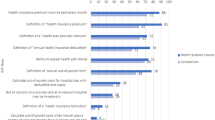Abstract
The purpose of this study is to examine the potential effects of consumer financial education on insurance advice seeking with a large and representative national data set in the U.S. Previous research has examined factors associated with insurance advice seeking. After controlling for these factors, financial education, which has not been examined in previous research, is positively associated with this behaviour. Specifically, high school and workplace financial education show positive associations with insurance advice seeking. Further analyses show that there are differences in insurance advice seeking between consumers with and without life insurance.
Similar content being viewed by others
Notes
For more information about this data set, see FINRA IEF (2013).
References
Blinder, Alan S. 1973. Wage Discrimination: Reduced Form and Structural Estimates. Journal of Human Resources 8 (4): 436–455.
Calcagno, Riccardo, and Chiara Monticone. 2015. Financial Literacy and the Demand for Financial Advice. Journal of Banking & Finance 50: 363–380.
Collins, J. Michael. 2012. Financial Advice: A Substitute for Financial Literacy? Financial Services Review 21 (4): 307–322.
Cude, Brenda J. 2005. Insurance Disclosures: An Effective Mechanism to Increase Consumers’ Insurance Market Power? Journal of Insurance Regulation 24 (2): 57–80.
Cummings, Benjamin F., and Russel N. James. 2014. Factors Associated with Getting and Dropping Financial Advisors Among Older Adults: Evidence from Longitudinal Data. Journal of Financial Counseling and Planning 25 (2): 3–19.
Diacon, Stephen, and Christine Ennew. 2001. Consumer Perceptions of Financial Risk. The Geneva Papers on Risk and Insurance—Issues and Practice 26 (3): 389–409.
Fernandes, Daniel, John G. Lynch Jr., and Richard G. Netemeyer. 2014. Financial Literacy, Financial Education, and Downstream Financial Behaviors. Management Science 60 (8): 1861–1883.
Finke, Michael S., Sandra J. Huston, and Danielle D. Winchester. 2011. Financial Advice: Who Pays. Journal of Financial Counseling and Planning 22 (1): 18–26.
Finra, I.E.F. 2013. Financial Capability in the United States: Report of Findings from the 2012 National Financial Capability Study. Washington, DC: FINRA Investor Education Foundation.
Grable, John E., and Swarn Chatterjee. 2014. Reducing Wealth Volatility: The Value of Financial Advice as Measured by Zeta. Journal of Financial Planning 27 (8): 45–51.
Hanna, Sherman D. 2011. The Demand for Financial Planning Services. Journal of Personal Finance 10 (1): 36–62.
Huston, Sandra J. 2010. Measuring Financial Literacy. Journal of Consumer Affairs 44 (2): 296–316.
Lachance, Marie-Eve, and Ning Tang. 2012. Financial Advice and Trust. Financial Services Review 21 (3): 209–226.
Lusardi, Annamaria, and Olivia S. Mitchell. 2009. How Ordinary Consumers Make Complex Economic Decisions: Financial Literacy and Retirement Readiness. Working Paper No. w15350. Washington DC: National Bureau of Economic Research.
Lusardi, Annamaria, and Olivia S. Mitchell. 2014. The Economic Importance of Financial Literacy: Theory and Evidence. Journal of Economic Literature 52 (1): 5–44.
Oaxaca, Ronald. 1973. Male-Female Wage Differentials in Urban Labor Markets. International Economic Review 14 (3): 693–709.
Porto, Nilton, and Jing Jian Xiao. 2016. Financial Literacy Overconfidence and Financial Advice Usage. Journal of Financial Service Professionals 70 (4): 78–88.
Remund, David L. 2010. Financial Literacy Explicated: The Case for a Clearer Definition in an Increasingly Complex Economy. Journal of Consumer Affairs 44 (2): 276–295.
Robb, Cliff A., Patryk Babiarz, and Ann Woodyard. 2012. The Demand for Financial Professionals’ Advice: The Role of Financial Knowledge, Satisfaction, and Confidence. Financial Services Review 21 (4): 291–305.
Stigler, George J. 1961. The Economics of Information. Journal of Political Economy 69 (3): 213–225.
Tang, Ning, and Marie-Eve Lachance. 2012. Financial Advice: What About Low-Income Consumers? Journal of Personal Finance 11 (2): 121–158.
Tennyson, Sharon. 2011. Consumers’ Insurance Literacy: Evidence from Survey Data. Financial Services Review 20 (3): 165–179.
Von Gaudecker, Hans-Martin. 2015. How Does Household Portfolio Diversification Vary with Financial Literacy and Financial Advice? The Journal of Finance 70 (2): 489–507.
Winters, Robert C. 1993. The Consumer Movements and the Impact on Insurance: An American Point of View. The Geneva Papers on Risk and Insurance—Issues and Practice 18 (4): 412–414.
Xiao, Jing Jian, Cheng Chen, and Fuzhong Chen. 2014. Consumer Financial Capability and Financial Satisfaction. Social Indicators Research 118 (1): 415–432.
Xiao, Jing Jian, and Barbara O’Neill. 2016. Consumer Financial Education and Financial Capability. International Journal of Consumer Studies 40 (6): 712–721.
Xiao, Jing Jian, and Nilton Porto. 2016. Which Financial Advice Topics are Positively Associated with Financial Satisfaction? Journal of Financial Planning 29 (7): 52–60.
Xiao, Jing Jian, and Nilton Porto. 2017. Financial Education and Financial Satisfaction: Financial Literacy, Behavior, and Capability as Mediators. International Journal of Bank Marketing 35 (5): 805–817.
Author information
Authors and Affiliations
Corresponding author
Rights and permissions
About this article
Cite this article
Xiao, J.J., Porto, N. Financial education and insurance advice seeking. Geneva Pap Risk Insur Issues Pract 44, 20–35 (2019). https://doi.org/10.1057/s41288-018-0108-1
Received:
Accepted:
Published:
Issue Date:
DOI: https://doi.org/10.1057/s41288-018-0108-1




